Five years. Five projects. One greener Adelaide. Here’s what we’ve achieved together in streets, schools, backyards and beyond.
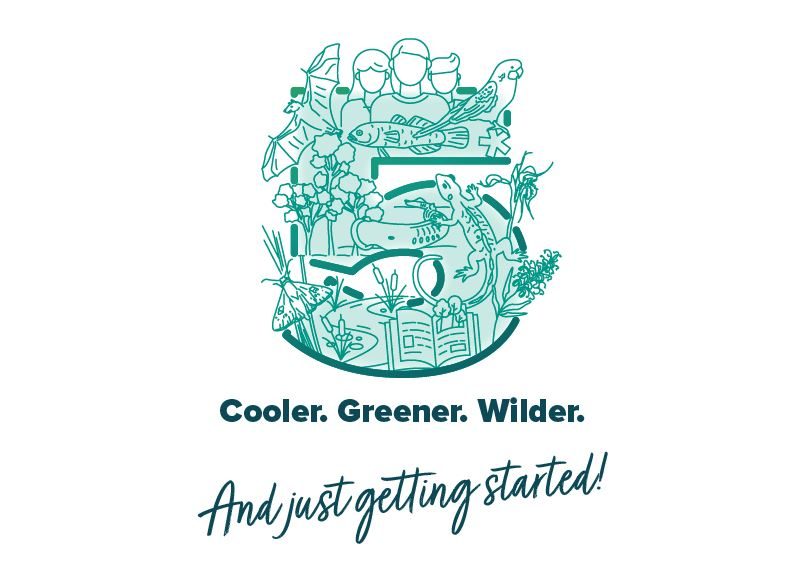
Since 2020, we’ve brought rivers back to life, backed community greening dreams, mapped the trees that shape our streets, put Adelaide on the world stage, and helped threatened species return home. These achievements are all thanks to community, councils and volunteer groups rolling up their sleeves to green, cool and wild our city together.
To celebrate 5 years of impact, we’re spotlighting 5 standout projects, each backed by 5 data points that show real change.
These aren’t just feel-good stories, they’re real proof that Adelaide is becoming cooler, greener and wilder. And we’re only just getting started!
We know these standout projects wouldn’t be possible without the steady, often unseen work behind the scenes to look after metropolitan Adelaide’s environment. From weed and pest control to community engagement and strategic planning and research.
This isn’t just a celebration, it’s a thank you to our team, partners, supporters and wider community.
Here’s what’s possible when people and nature grow together:
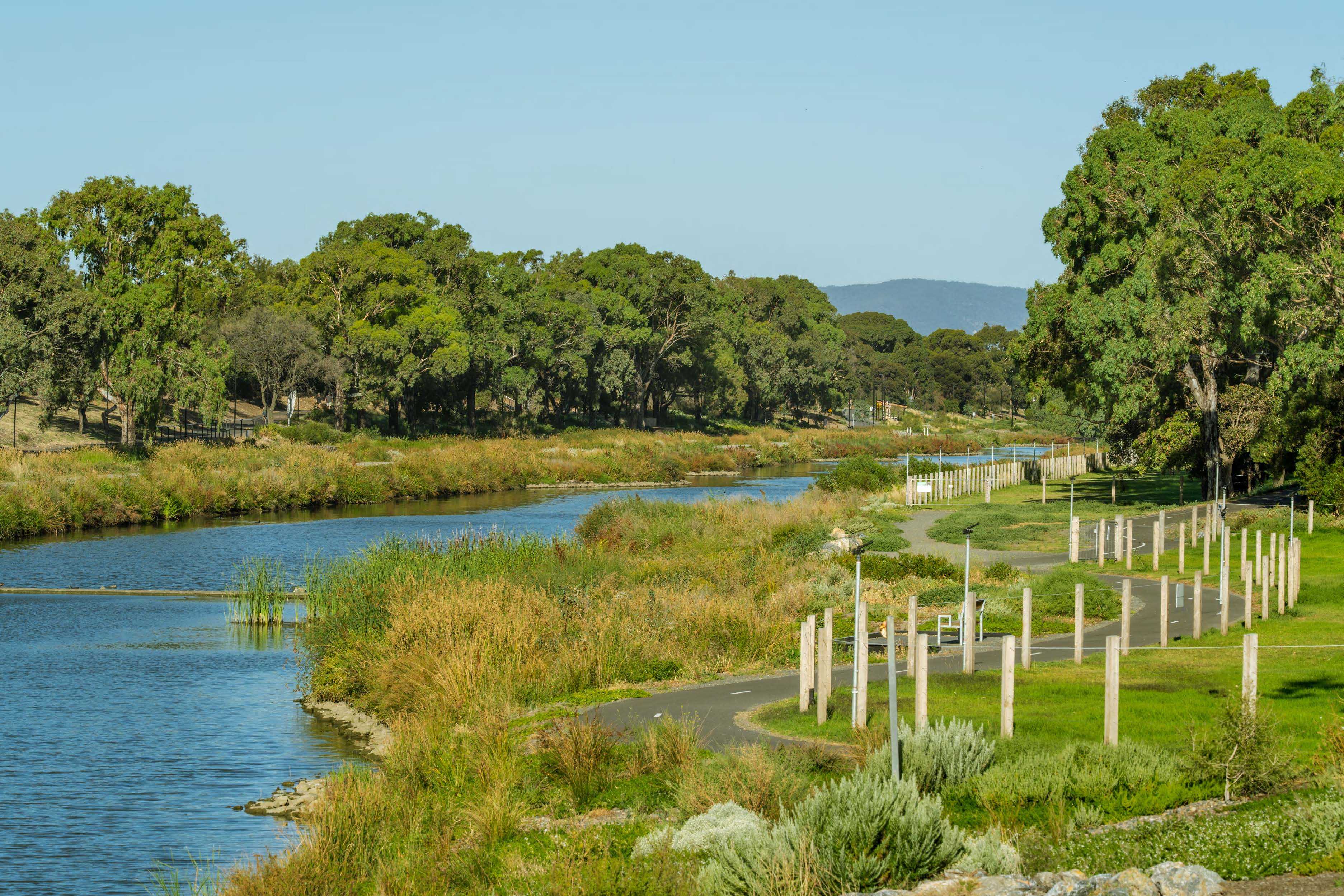
1. Breakout Creek Stage 3 Redevelopment: Reviving River Torrens / Karrawirra Pari in the west
The total 3 kilometre Breakout Creek Redevelopment is now completed. Transforming the far-western stretch of the River Torrens / Karrawirra Pari (running across the suburbs of Lockleys, Fulham and West Beach) from a fenced-off artificial channel into a thriving green corridor for people, wildlife and culture.
We revamped the final (aka, Stage 3) 1.6 km from Tapleys Hill Road in Lockley to Torrens Outlet in West Beach with native plants, wetlands, shared-use trails and striking public art. This stretch of river is now better for water quality, wildlife habitat, and community wellbeing. It cools the area, filters stormwater, and gives locals a place to walk, ride and reconnect with nature.
Why it matters: This transformation helps cool the local area, filters stormwater before it enters the river and flows out to sea, and provides a safe, accessible space for people to walk, ride and reconnect with nature. It supports environmental health while protecting and celebrating local culture through art and design.
What’s changed:
- 245,000 native plants across 80 species
- 2 wetlands improving stormwater quality
- 6.2km of shared-use trails for walking and riding with accessible points and a footbridge
- 9 sculptures by Kaurna artist Allan Sumner
- Delivered by 4 partner agencies, with strong community involvement
Take a stroll along this rewilded stretch of river, you’ll feel the difference, and so will all of the wildlife that call this stretch home. It’s proof of what’s possible when we restore nature and community, side by side.
The project is a $18.7 million partnership between Green Adelaide, the City of Charles Sturt, the City of West Torrens, the South Australian Department for Housing and Urban Development through the Planning and Development Fund, the Australian Government through the Environment Restoration Fund, and SA Water. The project is committed to working with the Traditional Owners of the Adelaide plains, the Kaurna people.
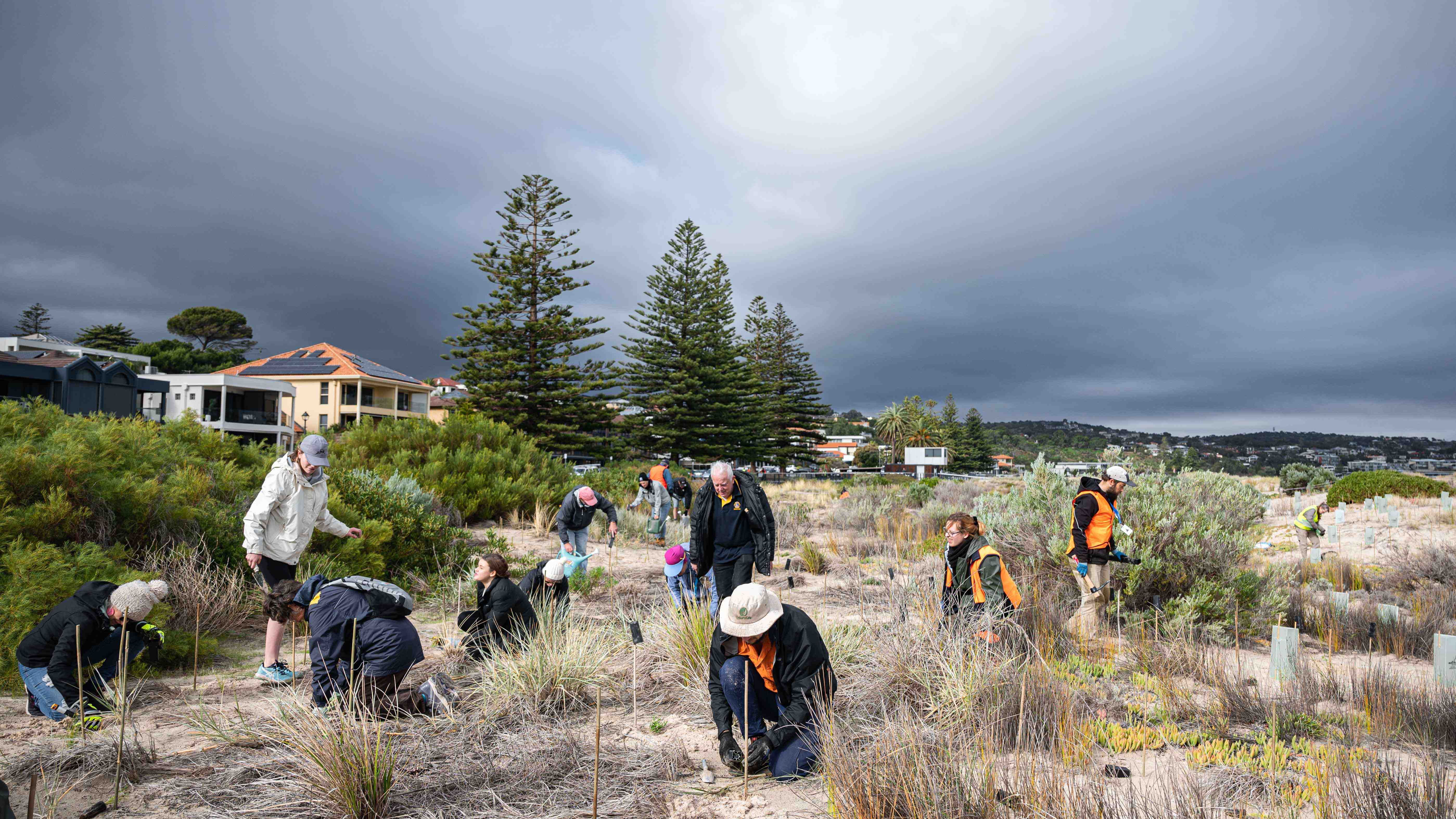
2. Green Grants: Supporting community action from the ground up
Over the past 5 years, we’ve invested nearly $12 million to support 290 initiatives for urban greening, restoration and research projects across metropolitan Adelaide to help volunteer, community groups, schools, councils and universities, bring nature back to their streets, parks, campuses and coastlines.
Through programs like Grassroots Grants, Cooler, Greener, Wilder Grants, and Blue Carbon Futures Grants, local champions have led the way by restoring bushland, greening urban spaces, planting natives and exploring climate-smart solutions.
Why it matters: These initiatives drive real lasting change that cool our suburbs, through creating wildlife habitat, removing weeds, and building community pride, all while making environmental action tangible, visible, and local.
The impact in numbers:
- $12 million in funding
- 290 community-led projects supported
- 53,746 native plants in the ground
- 2,256 hectares of weeds removed
- Funding spread across 17 metropolitan Adelaide areas
These projects prove you don’t need to be a conservation expert to make a difference, just a good idea, local passion, and an agency like us to help make it happen.
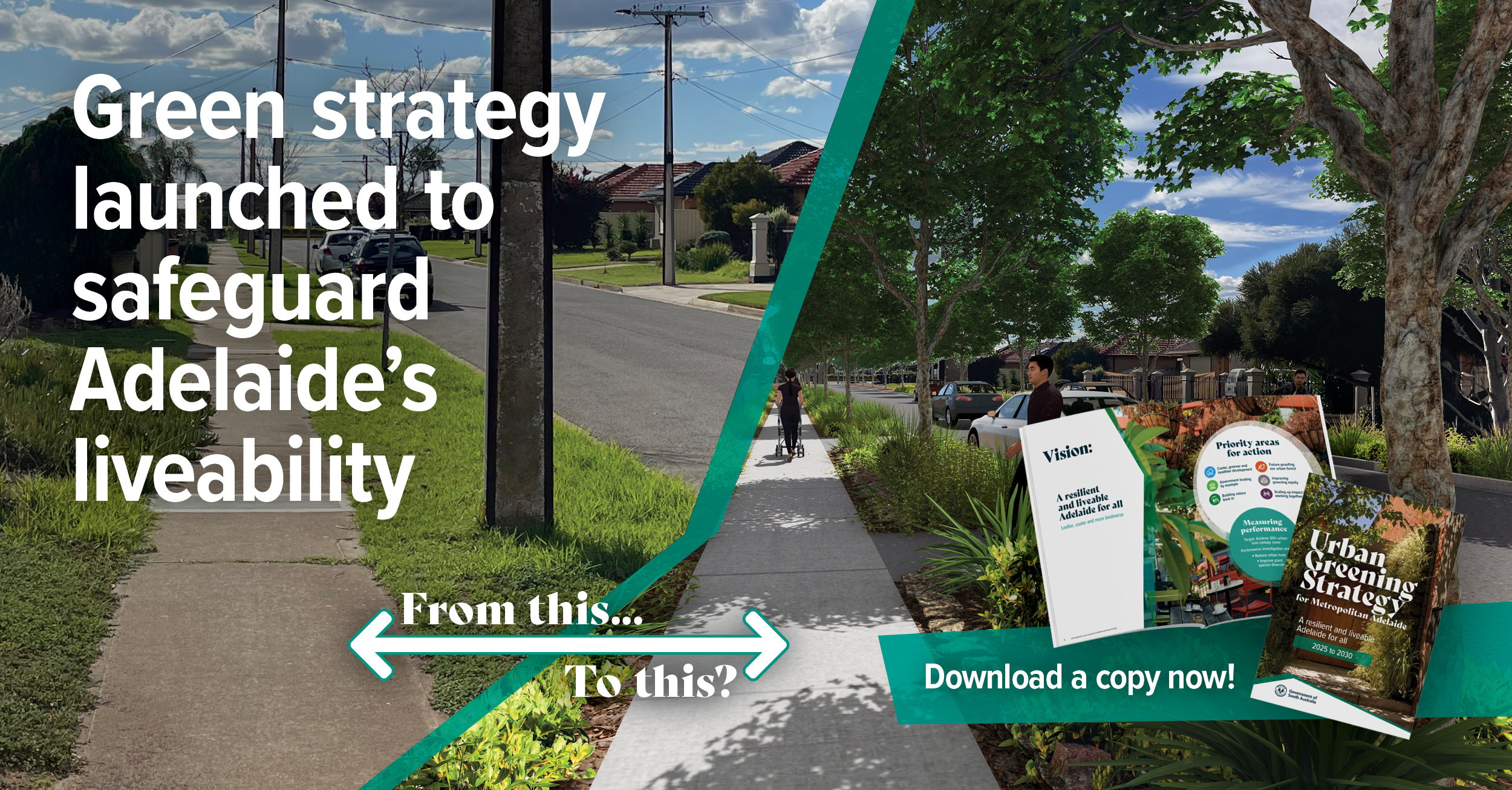
3. Urban Greening Strategy for Metro Adelaide: A big plan for a leafier and cooler city
Launched on 20 March 2025, the Urban Greening Strategy for Metropolitan Adelaide is a South Australian first and a practical roadmap to grow a leafier, cooler, and more biodiverse city together.
Backed by local data on tree canopy cover and species diversity, and broad public and expert input, the strategy sets 37 actions to increase greenery, reduce heat, and boost liveability.
Why it matters: Greening is no longer a ‘nice to have’, it’s essential infrastructure. More trees, cooler city and plant diversity mean cooler streets, stronger mental health, richer biodiversity and greater climate resilience.
The numbers tell the story:
- 17% tree canopy cover across metro Adelaide
- 96% community support for the strategy
- 100+ government and agency partners
- 400+ public submissions shaped the strategy
- 37 actions driving change on the ground
Co-designed with government, councils, industry stakeholders and the broader community; the strategy reflects a shared commitment. Not just to planting more trees, but to building a future-ready, resilient and liveable Adelaide for all.
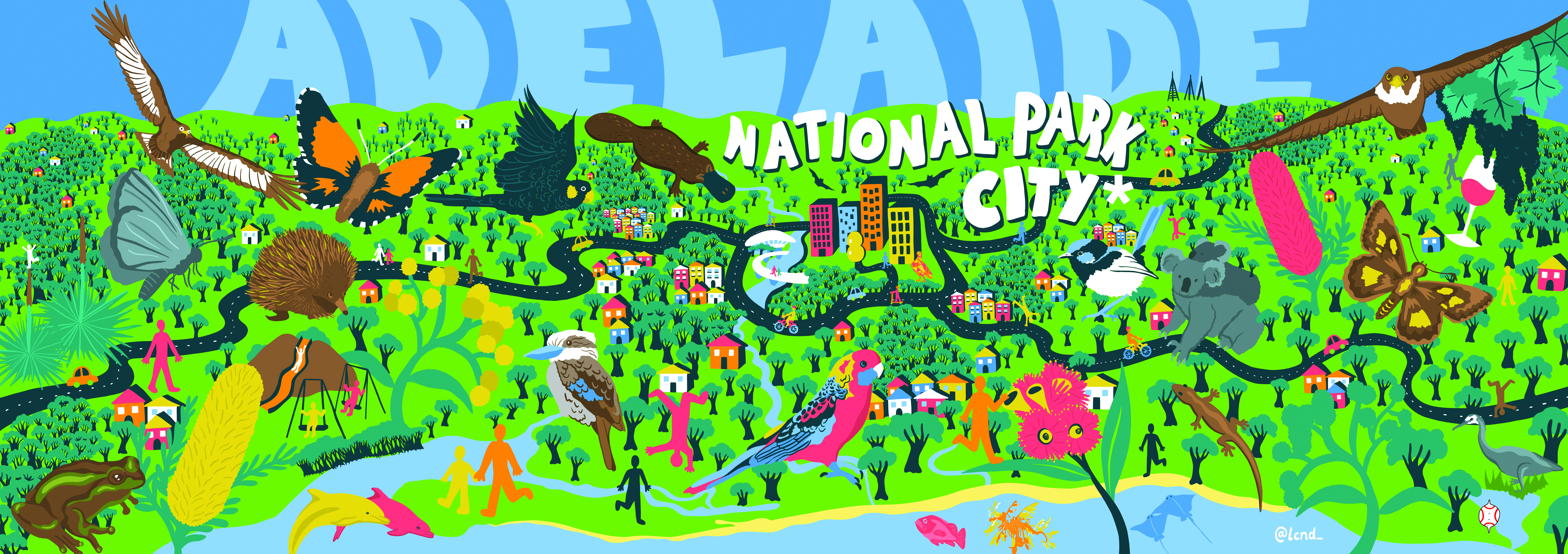
4. Adelaide becomes a National Park City: Global badge, local pride
On 10 December 2021, Adelaide was named the world’s second National Park City, joining London and becoming the first in Australia to earn the title.
This milestone celebrates Adelaide’s deep connection to nature and the collective effort of thousands of South Australians working to green our city and protect what makes it special.
Why it matters: The status shines a global spotlight on Adelaide’s leadership in urban nature, boosts eco-tourism, and supports our vision of a city where nature is part of everyday life. It’s a platform to showcase leadership and an invitation to do even more.
The story in numbers:
- Adelaide is the second National Park City in the world
- 2,300 public signatures backed our bid for the status
- 160+ community events held to celebrate the status
- 1300+ days of collective effort holding the title so far
- Part of a global network of 4 National Park Cities across 3 continents
This milestone wasn’t achieved by one organisation, it was powered by collaboration across government, community groups, environmental leaders, businesses, educators and thousands of passionate South Australians. Becoming ‘Adelaide National Park City’ is more than a title! It reflects Adelaide’s identity as a place where people and nature thrive together.”

5. Helping hand for the wild: Bringing back Adelaide's threatened species
From coastal dunes to city wetlands and native grasslands, we’re helping some of Adelaide’s most threatened species and communities to make a comeback. Restoring not just plants and animals, but the ecosystems they call home.
Through targeted habitat restoration (i.e. weeding over more than 14,000 hectares, pest animal control over 18,000 hectares, and strategic native plantings), native species such as the yellowish sedge-skipper butterfly and southern purple-spotted gudgeon, and plants too like the threatened sandhill greenhood (Pterostylis arenicola) orchid, are being reintroduced to places they haven’t been seen in decades. These efforts are supplementing or extending the range of existing populations and giving our most vulnerable species a fighting chance across metropolitan Adelaide. It also includes the reintroduction of 5 species that had previously gone extinct from the Green Adelaide region– tea-tree mistletoe (Amyema melaleucae), golden billy-buttons (Pycnosaurus chrysanthes), Lanky buttons (Leptorhynchos elongatus), showy copper-wire daisy (Podolepus jaceoides), and purple loosestrife (Lythrum salicaria). And not to mention – this work includes restoration of the River Torrens, which could even see platypus reintroduced.
Why it matters? Biodiversity loss isn’t just happening “somewhere else”, it’s happening here in Adelaide. By restoring habitat and reintroducing native species, we’re helping to rebuild healthy ecosystems, boost resilience to climate change and also help reconnect people with the natural world around them.
What’s changed:
- 500+ southern purple-spotted gudgeon released into metro waterways
- 70 hooded plovers across the Fleurieu Peninsula, an increase from 50 adult birds
- 25,000+ rare native plants of 30 species reintroduced across 50+ sites
- Ongoing monitoring and support for grey-headed flying foxes, with a strong colony up to 46,000
- Re-introduction of the yellowish sedge skipper butterfly to the Aldinga Washpool, following years of targeted habitat (Thatching Grass) restoration
These ‘rewilding’ projects are a reminder that even in a busy city, nature still belongs. With care, commitment, and collaboration, nature can thrive.
Five years in. Just getting started!
Five years in, we’re proud of what’s taken root and we’re just getting started.
Curious about what’s next? Explore our projects or sign up for our newsletter.
Want to green your patch? Learn more about our grants.
Love local environmental data? Check out our dashboards.
Cooler. Greener. Wilder. And just getting started!